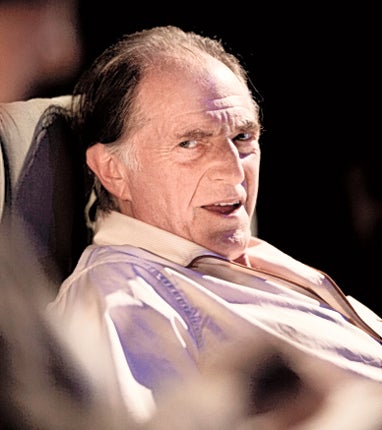Moonlight, Donmar Warehouse, London

In the diary of her life with Harold Pinter, Must You Go?, Antonia Fraser says that she and HP were amused when, reviewing the first performance in 1993, I called for "hard-edged political plays" – which I didn't. Slightly put off by Moonlight's mist of poetic sleep-talking, I hankered for the "hard, cutting, political edge" of some of his shorter pieces like One for the Road and Mountain Language.
Moonlight is a 75-minute tone poem of death and dying, of family disintegration, of skewed remembrance of things past. But it's also a self-parodying ragbag of Pinterisms: the bed-bound, dying Andy (David Bradley) and his estranged sons (Daniel Mays and Liam Garrigan) carry echoes of The Caretaker. The sons speak in inverted commas, swapping society backchat like the old boys in No Man's Land. The bedroom bleakness harks back to A Kind of Alaska.
Nothing gels, no fault of the director, Bijan Sheibani, who conjures an eerie half-light, with bright edging, and underpins dialogue with a portentous rumble. There's an admission of the play's arbitrary, rambling nature in the opening line-up of the five family members in silhouette: they will live the dream, but only in bursts.
Daughter Bridget (Lisa Diveney) is now listed as "a ghost". Before wandering off into the jungle (of life and mental instability?), she is careful not to wake her mother and father who, when they look at her, she says, see all that remains of their lives.
Bradley breaks the ice, and licenses our laughter, with his first scoffing aside: "It's enough to make a cat laugh." Then, quickly, "Do we have a cat?" He is raging against the dying of the light while his wife, Bel (vocalised with velvet restraint by Deborah Findlay), sits passively at his bedside. The younger son is in a bed elsewhere, like a Dostoevsky dosser, while the elder generates cross-talk patter routines.
Andy spied on his wife and her lover in a restaurant, cringing behind a vase of flowers and The Brothers Karamazov. Bel's lover was "Rafe" the soccer ref, whose wife, Maria, was Andy's lover in the first part of their marriage; she was also Bel's other lover. Ralph (Rafe) gave the arts a chance after years at sea. For a time, it was all go: football, the arts, the odd pint. "I preferred a fruity white wine, but you couldn't actually say that in those days."
Ralph also says he fell dead at his wife's feet. So he's a ghost, too, though Paul Shelley is as pleasingly fleshy as Carol Royle's Maria is fussingly proud of their own children. Andy wants only to see his grandchildren. And to have a drink. Bradley rises, crosses the room and pours a tumbler. "Bollocks to the lot of them, bugger them all. Cheers."
One riff about Bel giving Andy her body – "Here you are, here's my body, you said" – is pure Dudley Moore, just as the elder son's analysis of the life of Riley, which Andy led, reminds you of Pinter's origins in revue writing. But it's all a bit like an old motorbike spluttering into gear without roaring into action. The poignancy of Andy facing death in a moonlight with no cloud is dramatically fake, too, something clamped on, however personal to Pinter himself.
To 28 May (0844 871 7624; www.donmarwarehouse.com)
Subscribe to Independent Premium to bookmark this article
Want to bookmark your favourite articles and stories to read or reference later? Start your Independent Premium subscription today.

Join our commenting forum
Join thought-provoking conversations, follow other Independent readers and see their replies